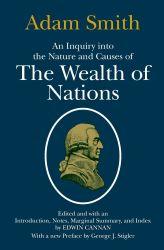
The Wealth of Nations, written by Adam Smith, is the precursor to modern economics as we know it. Smith delves into seemingly everything, from why taxes on gold are less than silver (the answer: because gold, unlike silver, is easily refineable and is far more valuable per ounce. if a high tax on gold were to occur people would have an incentive simply to hide the gold which would be easy because it is smaller to hide/can be hid in a purer form) to how specialization gives way to most profit (for example, 10 men each creating their own pins would be far less efficient that 10 men creating the same pin. Creating the same pin could be divided into smaller tasks, with one person primary repeating one task. This would allow for far more efficiency than individuals doing all the parts of pin making - cutting the wire, flattening the head, attaching the head, sharpening the head, etc - by themselves. The only reason I gave it a four was because of the difficulty I had reading it. When reading, I needed to stop and use the dictionary almost every page because I did not know words. I would definitely not recommend this for a reader looking for a leisurely read. It was anything but.
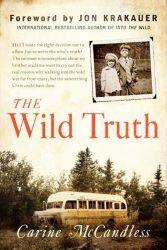
"The Wild Truth" is Carine McCandless' follow-up to Jon Krakauer's "Into the Wild". Carine McCandless wrote this novel after being pained by the reactions to "Into the Wild", especially the general opinion on Chris McCandless' self-inflicted exile from common society. This book succeeds in explaining more of Chris' life before his hitchhiking escapade. These sections were my favorite part of the book: unfortunately, they were mostly only present in the beginning. I struggled to pull through the longer sections where Carine explained her own life. Parts felt unnecessary, other section dragged on too long, and even more just felt completely unrelated to Chris or "Into the Wild". I wanted to read this book to understand Chris. I enjoyed learning about Carine, but I was reading for Chris. I'm quite lucky that I can't relate to large parts of this book. "The Wild Truth" really drags the reader along to help them understand the terrible abuse in the McCandless family. I can understand the difficult parents; I can relate to the family drama, constant switching between divorce and being back together, etc. that Carine had to live through. Regardless, this book stepped too far away from "Into the Wild" in a way that I did not enjoy. However, this book was still informative about the general McCandless family. There are absolutey readers in the world who can take more from this book than I could, but I will never consider this one of my favorite books.
Reviewer Grade: 11
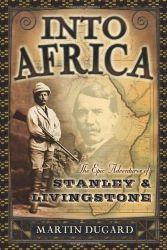
Into Africa, written by Martin Dugard, details the epic adventures of Stanley Livingstone and his trek across Africa to find the source of the Nile River. Livingstone battles disease, unfriendly tribes, and stubborn porters (the people who help carry supplies) in his journey. The brutal, but beautiful march encompasses Africa from it sweltering hot savannahs to it thick rainforests. I would recommend this book to anyone who likes adventure because this book is about the exploration of Africa. I enjoyed this book because it taught me a lot more about Africa and it's people.
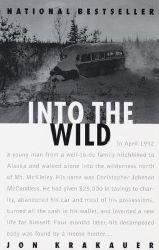
Jon Krakauer's "Into the Wild" might be the greatest nonfiction book I have read this year. I was assigned this book to read over my summer break for my English class. I am extremely grateful for this because it was very likely that I would not have discovered this masterpiece on my own. My favorite part about the book was the exact thing that Krakauer wared about in his forward; the author's similar personal experience. In a more general term, I savored every moment where Krakauer connected McCandless' story to other lesser-known examples in history, like John M. Waterman or Gene Rosellini. My least favorite part about the book wasn't explicitly in the book: the lack of definitive information outside of Into the Wild about McCandless makes me doubt some of the credibility of the information that Krakauer provided. Even if the factual information was true, I am still confronted with the author's admission that some of the details in the book were opinionated by Krakauer. The book was full of surprises. I will not spoil any, but the father's reaction when seeing "the scene" shocked me. I personally could not relate to any of the characters in this book. I lack the all-consuming drive to
reach a mostly independent state from society, and I have never fretted over a lost child. Regardless of my lack of a personal connection, this book was an extremely powerful book about those in society that wish to be outside society.
Reviewer Grade: 11
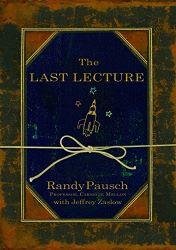
"The Last Lecture" is a non-fiction book based on a lecture delivered by Randy Pausch, a computer science professor diagnosed with terminal cancer. Pausch's lecture, titled "Really Achieving Your Childhood Dreams," was delivered at Carnegie Mellon University and became a sensation, garnering millions of views online. The lecture was eventually turned into a book by Jeffery Zaslow. In the book, Pausch expands on the themes from his lecture, sharing his wisdom, insights, and life lessons as he confronts his mortality. He encourages readers to pursue their passions, live fully in the present, and embrace the power of perseverance and resilience. Pausch's poignant and inspiring message serves as a reminder of the importance of cherishing every moment and making the most of the time we have. I believe his heart-wrenching story should be shared with everyone. We are all mortal in the end, but most of us choose to act as if we are not; Pausch encourages us to not waste the valuable time that we have.
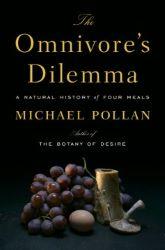
The Omnivore's Dilemma, written by Micheal Pollan, provides the reader with an analytical view of what we, as humans, should eat. He dives into the industrialization of corn production. Because the government of the United States subsidizes corn, more farmers produce corn than in a free market society, thus there is a surplus of corn. With this surplus, industries evolved to consume the cheap, plentiful corn. One example is the concentrated animal feeding operation (CAFO, commonly referred to as a "feedlot"). People feed cows (that are packed in fences) the cheap corn, which decreases the price of the cows, which then leads to the creation of more business selling far more affordable cow meat, such as McDonalds. Although the food is far more accesible and less of a budget burden, Pollan raises questions about the health externality of eating corn fed cows. Because the cows are packed together, disease tends to run rampant, so the cows' food (chopped up corn) is mixed with a variety of antibiotics and hormones to control disease. When we eat the cow, what is fed to the cow is now fed to us. I enjoyed the book because it made me more cognizant about the food I put in my body, and I would recommend this book to anyone who is curious about the logistics of how and where we get our food.
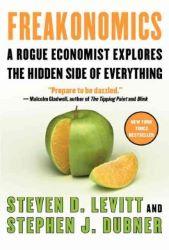
"Freakonomics" written by economist Steven D. Levitt and journalist Stephen J. Dubner, explores unconventional connections between economics and various aspects of society, challenging conventional wisdom. Levitt's research delves into topics such as the economics of drug dealing, the impact of parenting on a child's success, and the hidden motivations behind seemingly irrational behaviors. The authors highlight the power of data analysis and critical thinking to uncover surprising insights. The book ultimately encourages readers to question assumptions, think outside the box, and view the world through an economic lens to gain a deeper understanding of human behavior. I recommend this book to anyone who enjoys economics, as well as questions conventional ideas of society.
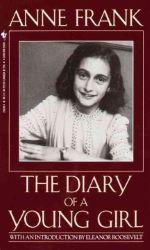
"Diary of a Young Girl" is the poignant and haunting diary of Anne Frank, a Jewish teenager hiding from the Nazis during World War II. Anne chronicles her life in hiding in Amsterdam, where her family sought refuge in a secret annex. Through her diary entries, she shares her hopes, dreams, fears, and frustrations, providing an intimate account of the daily struggles and emotional turmoil endured by Jews in hiding. I enjoyed the book; having experience the Covid-19 shutdown, the atrocity that she had to go through put my life into perspective. Sometimes what individuals go through is difficult, but is nothing compared to horrors experienced by others. I recommend everyone to read this book because it fosters a sense of humility in all that read it.
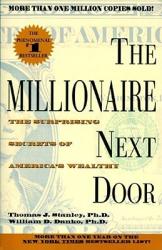
The Millionaire Next Door is a collection of studies about the secretive habits of millionaires done throughout the course of Thomas J. Stanley's career. He juxtaposes making a lot of money with being wealthy: you can make an incredible salary, but to be wealthy you have to save that earned money. For example, in the book there are two examples: One is a man who has been living in the same small house for 20 years, drives a 10 year old truck, and uses a Casio Duro (an affordable watch). The other is a doctor who earns $700,000 dollars a year. The doctor has an enormous house, fancy new cars, and embezzles his wife with divine jewelry. Obviously, the doctor is rich, right? Incredibly, the doctor's net worth is less than "the regular joe's". The doctor's obsession with having consumer goods limits his net worth. His need to "fit in" necessitates him spending almost all of his net worth on tangible goods. From the outside, he appears rich, but on the inside he has little retirement savings and no mental bandwith to focus on the far future. Meanwhile, the man who has been living in the same house for 20 years has seen the value of his house triple. His affordable lifestyle allows him to not only live below his means, but to invest his time (not spent shopping) and money wisely so that he builds a fortune. The Millionaire Next Door teaches us that the typical millionaire as seen by society (fancy clothing, the "newest iPhone", etc) is not actually a millionaire, but rather an
under-accumulator of wealth with nonexistent sapience in regard to the future. I would recommend this book to those who want to be wealthy in the future because becoming wealthy does not occur overnight: it takes years of discipline, sacrifice, and integrity. And the best time to start on your financial journey to freedom is now.
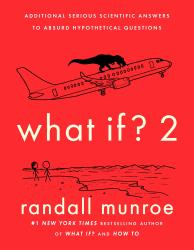
As a fan of XKCD, I've loved the What If? spinoff series despite how irregularly Randall has updated it. Considering there have only been five new posts in the last five years, and they were all in the months leading up to the release of this book, I needed a good dose of What If? Partly because it had been so long since I had read any What If? posts, all the chapters in this book felt fresh and hilarious. Now that I read through it, I'm sad that I'll have to wait another eight years for a third book in the series.
Randall always has a down-to-earth style of describing incredibly complicated scientific concepts. This means What If? 2 is quite educational once you get past the ridiculous premises that readers have sent in. It's also nice how each chapter is easily readable in a few minutes so that I could just pick it up and get a good laugh before moving on to something else. After all, this book is straight-up funny. This should come as no surprise—again—given the absurd questions readers asked Randall.
It felt like this book had more new content than the previous book in the series. This might not be true, but it felt that way because I hadn't read any of the posts that made it into this book in several years. This was my main qualm with the first book: that it was just a printed-out part of the internet. In this sequel, there weren't just new questions answered but also quick little sections that covered easily answerable questions (as compared to its predecessor's highlights of disturbing questions with no answers). Overall, I found it to be a fun read and I'm counting the days until What If? 3 comes out.
Hilarious and scientifically accurate answers to oddball questions, I give What If? 2 4.5 stars out of 5.
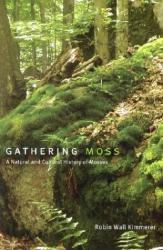
Gathering Moss by Robin Wall Kimmerer is a thought-provoking and beautifully written book that explores the world of moss and the ecological relationships that exist in nature. As a botanist and member of the Citizen Potawatomi Nation, Kimmerer's perspective on nature is both scientific and cultural, offering a unique insight into the world of moss. The book is structured around a series of essays that delve into the various aspects of moss and the ways in which it interacts with other living beings. Kimmerer's writing style is poetic and evocative, with her descriptions of the moss and its surroundings painting a vivid picture of the world she is exploring. Her use of personal anecdotes and storytelling adds a personal touch to the book, inviting readers to connect with the natural world on a deeper level. One of the strengths of the book is the way in which Kimmerer explores the interconnectedness of all living things. Through her examination of moss and the relationships it has with other plants and animals, she demonstrates how all living things are dependent on one another and how our actions can have far-reaching consequences. Overall, Gathering Moss is a beautifully written and insightful book that offers a unique perspective on the natural world. Kimmerer's combination of scientific knowledge and cultural insights makes this book a must-read for anyone interested in ecology, indigenous perspectives, and the beauty of the natural world. Her poetic writing style and personal anecdotes make it a very accessible and engaging read.
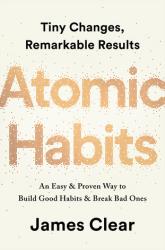
Atomic Habits, written by James Clear, details the formation of beneficial habits and the decimation of detrimental habits. Clear explains the importance of simply showing up for habits. He implements the two minute rule to develop habits: when starting a habit, one should only spend two minutes doing that habit. For example, show up to the gym, work out for two minutes, and then leave. Over time, this creates the ideology that, "well, I am already here [at the gym] so I might as well stay here a little longer and exercise." Primary, this serves to establish the fact that "I am not the kind of person to skip workouts." Clear also describes how we fail to develop successful habits. He insightfully notes that "the greatest threat to success in not failure, but boredom." Remarkably, boredom is one of the largest predicaments humans have. When people are bored, they not only impede their ability to succeed, but they also form bad habits, such as looking at social media. Thus, to be successful people have to be disciplined when they are bored. They have to be "all weather mediators", where your feelings and emotions do not impede your goal of sucess.
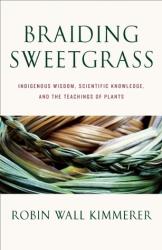
Braiding Sweetgrass, written by Robin Wall Kimmerer, is a deeply insightful and poetic book that blends Indigenous knowledge, scientific understanding, and personal narrative to offer a powerful vision of how we can heal our relationship with the natural world. Through a series of essays, Kimmerer shares her knowledge and experiences as a botanist and a member of the Citizen Potawatomi Nation, encouraging readers to see the world around them in a new and more meaningful way. Through her personal experiences and reflections, she demonstrates the ways in which scientific knowledge and traditional Indigenous wisdom can be complementary and mutually enriching. Her discussions of plants, animals, and ecosystems are rooted in both Western science and Indigenous knowledge, offering a holistic understanding of the natural world that is both insightful and inspiring. he weaves together scientific facts, personal anecdotes, and traditional stories to create a narrative that is both informative and emotionally engaging. Her prose is rich with metaphor and symbolism, inviting readers to see the world in a new light and to appreciate the interconnectedness of all living things. Additionally, her reflections on the importance of reciprocity, gratitude, and relationship-building are particularly insightful, offering a powerful alternative to the dominant narrative of human domination over nature. Overall, this book was a very fascinating and eye-opening read that has honestly impacted the way I view life, science, and nature together. I would recommend this book to anyone interested in environmentalism, Indigenous knowledge, or the intersections between science and spirituality.
Reviewer Grade: 11.
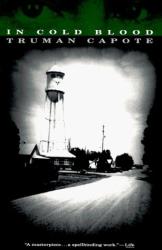
Truman Capote's In Cold Blood is a true crime account of the 1959 murder of the Clutter family in Holcomb, Kansas by the criminal duo Dick Hickock and Perry Smith. Capote's unique, journalistic writing style creates an intriguing narrative that blurs the line between fact and fiction. In my opinion, part one of four starts the book off a bit slowly, and Capote includes a lot of extra details that make the book seem longer than it is. However, once the book transitions into the backgrounds and motives of the killers and moves on from introductory information, it is quite a thought-provoking read. Capote's portrayal of the murderers is particularly fascinating because he delves into their motivations and psychological states in a way that is both haunting and insightful. This novel explores themes of morality and the American Dream, which are easily connected to modern day society. Overall, In Cold Blood is a must-read for anyone interested in true-crime and journalism, as it offers a unique and suspenseful account of one of America's most notorious crimes. I enjoyed reading this novel, although just one read was enough for me.
Reviewer Grade: 11.
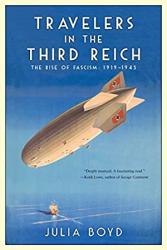
Travelers In The Third Reich tells the stories of some people who lived in Germany during the second world war. The book shows the horrors of life in Germany at the time by describing the hangings and executions through the eyes of the people that were there. It also talks about the politics and economy during the war and how it changed the lives of the German civilians.
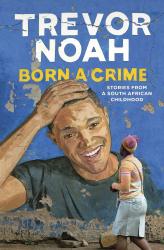
I had to read this book for my AP English class and usually I am not the biggest fan of books I have to read for school but this one was really good. This book contains a bunch of different stories of comedian Trevor Noah's childhood, ranging from the small interactions with his family and friends to the event that changed his life. Trevor Noah delivers these stories in a fun and lighthearted way even if the stories themselves are not. The book was fast paced and really well written. The humor combined with the pacing helped me to stay engaged and I really enjoyed reading it. I enjoyed how short the stories were and how it helped the audience to empathize with Trevor and gave them an insight to what it was like to grow up in South Africa. I recommend this book to anyone looking for a quick and lighthearted read.
Reviewer Grade: 11
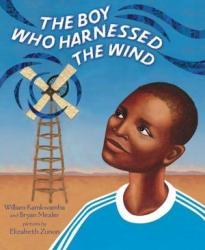
The Boy who Harnessed the Wind is a nonfiction autobiography about a boy falling in love with science. The boy, William Kamkwamba, is the son of a poor African farmer. William grows up creating toys and playing games. When his father can no longer afford to send William to school, William goes to a library and learns about electricity generation. William soon builds a windmill out of the discarded items found at the local junkyard and provides his house with electricity when the windmill spins. Word of his incredible accomplishment spreads, and soon William gets the opportunity to fly to other countries and talk about his accomplishments and how his technology can be imitated throughout Africa to make life easier for Africans. Because of his success on the world stage, he now has the connections and money to send himself and his siblings to school. After completing college in the United States William moved back to his old hometown and inspires young children by giving them opportunities to enrich themselves in education.
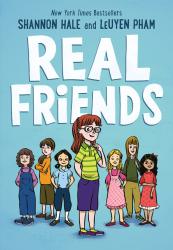
The graphic novel “Real Friends” is about a girl named Shannon. Shannon and Adrienne have always been best friends, but when Adrienne begins hanging out with the popular girl, Shannon is just left in the dust. The novel follows Shannon as she goes through one big roller coaster called middle school. The book touches on the subject of how difficult middle school can be and challenging middle school friendships.
I enjoyed this book because I can relate to the lessons and feelings Shannon has towards her friendships and surroundings. Middle School is a tough and confusing time in everyone’s life, and knowing that you have similar experiences to others is nice to know. I would recommend this book to anyone who is struggling to find themselves throughout middle school or even awkward years.
Reviewer Grade: 8

Killing Lincoln, written by Bill O'Reilly, is a historical fiction novel detailing the account of the Civil War and the events that led up to the assassination of Abraham Lincoln. The narrator takes the reader along a tale of battle, and a timeline of Booth growing more and more anti-Lincoln until he finally decides to buy a gun and shoot Lincoln. I enjoyed the book because there is so much information, it's almost as if the narrator were there, writing everything down in the present. I would recommend this book to anyone who likes history, as well as anyone who is possibly enrolled in a history class.
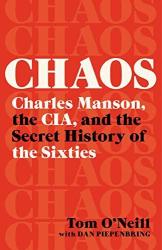
O'Neill's 20-year investigation succeeds at systematically breaking down an impressive amount of the infamous case's centrifugal details and characters, many previously unknown, untold or cast as insignificant. The guy's manic fixation is contagious. The only thing I found unnecessary was the frequency and extent to which O'Neill expressed self-doubt in the 'coda' sections of many chapters, second guessing "where it all goes." It doesn’t matter that there aren’t neat ends; his scrutiny has produced more than enough evidence not only to explode the popular understanding of the details surrounding the Manson story, but also suggest far-reaching implications for all of us in the process.


